La terre de la grande promesse est un film polonais de genre Drame réalisé par Andrzej Wajda avec Daniel Olbrychski
La terre de la grande promesse (1975)
Ziemia obiecana
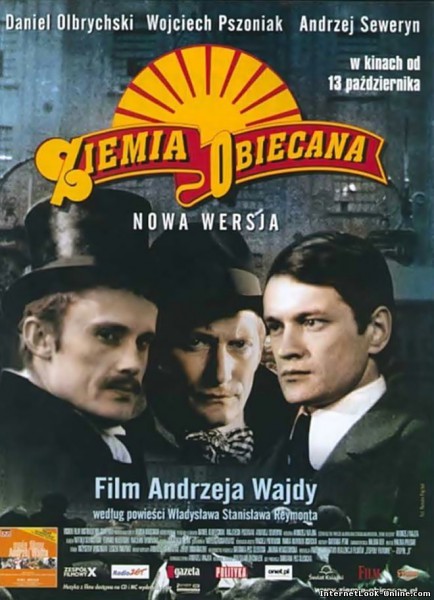
Si vous aimez ce film, faites-le savoir !
La Terre de la grande promesse (Ziemia obiecana) est un film polonais réalisé par Andrzej Wajda, sorti en 1975.
Synopsis
À la fin du XIX siècle, Łódź est devenue le centre textile le plus important d'Europe. La société polonaise en est profondément bouleversée.Acteurs

Daniel Olbrychski
(Karol Borowiecki, Polonais catholique)
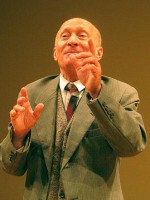
Wojciech Pszoniak
(Moryc Welt, juif)

Andrzej Seweryn
(Max Baum, Allemand)

Anna Nehrebecka
(Anka)

Kalina Jędrusik
(Lucy Zuckerowa)
Commentaires
Postez un commentaire :
Suggestions de films similaires à La terre de la grande promesse
Il y a 85 films ayant les mêmes acteurs, 38 films avec le même réalisateur, 62887 ayant les mêmes genres cinématographiques (dont 4068 ayant exactement les mêmes 2 genres que La terre de la grande promesse), pour avoir au final 70 suggestions de films similaires.Si vous avez aimé La terre de la grande promesse, vous aimerez sûrement les films similaires suivants :
 , 2h27
, 2h27Réalisé par Andrzej Wajda
Genres Drame, Guerre, Historique, Romance
Thèmes Histoire de France, Guerres napoléoniennes
Acteurs Bogusław Linda, Alicja Bachleda-Curuś, Jerzy Bińczycki, Daniel Olbrychski, Grażyna Szapołowska, Andrzej Seweryn
Note60%





La scène se déroule en Lituanie en 1812, alors que la Pologne est rayée de la carte. Deux familles s'affrontent, l'une alliée aux Russes, l'autre indépendantiste. En juin 1812, Napoléon marche sur Moscou et franchit le Niémen.
 , 1h34
, 1h34Réalisé par Andrzej Wajda
Origine Allemagne
Genres Drame
Acteurs Wojciech Pszoniak, Daniel Olbrychski, Andrzej Łapicki, Marek Perepeczko, Jerzy Zelnik, Vladek Sheybal
Note67%






Les Noces (1973)
, 1h42Réalisé par Andrzej Wajda
Origine Pologne
Genres Drame
Thèmes Théâtre, Adaptation d'une pièce de théâtre
Acteurs Daniel Olbrychski, Ewa Ziętek, Andrzej Łapicki, Wojciech Pszoniak, Franciszek Pieczka, Marek Perepeczko
Note68%





A poet marries a peasant girl. Their wedding reception follows. The celebration of the new marriage moves on from the church to the villager's house. In the rooms adjoining that of the wedding party, guests continually burst into arguments, make love, or simply rest from their merriment, dancing and feasting. Interspersed with the real guests are the well-known figures of Polish history and culture, who represent the guilty consciences of the characters. The two groups gradually begin a series of dialogues. The Poet (played by Andrzej Łapicki) is visited successively by the Black Knight, a symbol of the nation's past military glory; the Journalist (played by Wojciech Pszoniak), then by the court jester and conservative political sage Stańczyk; and the Ghost of Wernyhora (Marek Walczewski), a paradigm of leadership for Poland. Wernyhora presents the Host with a golden horn symbolizing the national mission, and calls the Polish people to a revolt. One of the farm hands is dispatched to sound the horn at each corner of Poland, but he loses the horn soon after.

Danton (1983)
, 2h16Réalisé par Andrzej Wajda
Origine Pologne
Genres Drame, Biographie, Historique
Thèmes Théâtre, Politique, Adaptation d'une pièce de théâtre, Histoire de France, Révolution française
Acteurs Gérard Depardieu, Wojciech Pszoniak, Anne Alvaro, Patrice Chéreau, Bogusław Linda, Roger Planchon
Note73%





Paris, dans un printemps 1794 qui semble glacé : les premiers plans montrent des sans-culottes se réchauffant près d'un brasero. Depuis septembre 1793 c'est la première partie de la Terreur, où la faction perdante, ici les moins extrémistes, sont menés à la guillotine.

Korczak (1990)
, 1h55Réalisé par Andrzej Wajda
Origine Pologne
Genres Drame, Guerre, Biographie, Historique
Thèmes Religion, Politique, Religion juive
Acteurs Wojciech Pszoniak, Aleksander Bardini, Ewa Dałkowska, Anna Mucha, Agnieszka Krukówna, Teresa Budzisz-Krzyżanowska
Note73%





Le film se passe pendant la Seconde Guerre mondiale, en 1942, dans le ghetto de Varsovie. Janusz Korczak a la charge de plusieurs centaines d'orphelins : il doit subvenir à leurs besoins dans des conditions très difficiles. On peut voir, par exemple, sur des photos d'époque prises dans ces orphelinats, que les enfants étaient pieds nus.
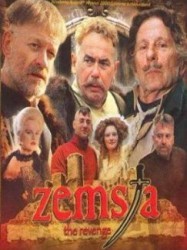
Zemsta (2002)
, 1h40Réalisé par Andrzej Wajda
Origine Pologne
Genres Comédie
Thèmes Théâtre, Adaptation d'une pièce de théâtre
Acteurs Roman Polanski, Janusz Gajos, Andrzej Seweryn, Katarzyna Figura, Daniel Olbrychski, Agata Buzek
Note56%





Raptusiewicz (Janusz Gajos) réside dans la moitié d'un château tandis que l'autre moitié est habitée par son rival détesté Rejent Milczek (Andrzej Seweryn). Raptusiewicz souhaite se marier avec Podstolina (Katarzyna Figura), la veuve de Lord High Steward, Podstolina cherchant un mari riche.

Cendres (1965)
, 3h54Réalisé par Andrzej Wajda, Andrzej Żuławski
Origine Pologne
Genres Drame, Guerre, Historique
Acteurs Daniel Olbrychski, Beata Tyszkiewicz, Pola Raksa, Władysław Hańcza, Jan Koecher, Zbigniew Sawan
Note70%





Le film se déroule pendant les guerres napoléoniennes.
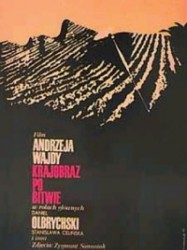
Paysage après la Bataille (1970)
, 1h41Réalisé par Andrzej Wajda
Origine Pologne
Genres Drame, Guerre, Historique, Romance
Acteurs Daniel Olbrychski, Aleksander Bardini, Stanisława Celińska, Tadeusz Janczar, Zygmunt Malanowicz, Mieczysław Stoor
Note69%





The Landscape After the Battle film tells a story of two young concentration camp survivors. A young Polish poet (Tadeusz) is asked by a pretty Jewish girl (Nina) to go with her to the West. His camp experience, however, prevents him from realizing the depth of her love for him, and he is reluctant to commit. The woman is accidentally shot dead by an American soldier, causing the poet to cry for the first time in years. The shock of her death brings back the world of feelings suppressed by his Nazi captors, and allows for his original creativity to reemerge.

Le Bois de bouleaux (1970)
, 1h39Réalisé par Andrzej Wajda
Origine Pologne
Genres Drame, Musical, Romance
Acteurs Olgierd Łukaszewicz, Daniel Olbrychski, Marek Perepeczko, Mieczysław Stoor, Andrzej Kotkowski
Note68%





Dans un petit village de Pologne, Borslaw vit seul avec sa fillette depuis la mort de sa femme dans une maison au fond des bois, désespéré. Stanislaw, frère de Borslaw, dandy gai et sympathique arrive au village, où il vient finir ses jours, étant a atteint d'une phtisie au stade terminal. Ce dernier, se sachant condamné, a décidé de profiter de la vie jusqu’au bout.
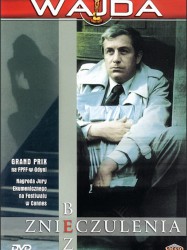
Sans Anesthésie (1978)
, 2h11Réalisé par Andrzej Wajda
Origine Pologne
Genres Drame
Acteurs Zbigniew Zapasiewicz, Ewa Dałkowska, Andrzej Seweryn, Krystyna Janda, Kazimierz Kaczor, Jerzy Stuhr
Note72%





Un célèbre journaliste polonais présente un problème pour les pouvoirs en place lorsqu'il affiche ses compétences et ses connaissances politiques dans une émission de télévision présentant des questions et réponses lors d'une conférence mondiale par un panel de journalistes. Ses ennemis lui enlèvent ses privilèges quand il est absent. Le choc d'être «indésirable» correspond à une déception plus profonde dans sa vie privée: sa femme a une liaison avec un jeune rival jaloux, et après 15 ans de mariage et deux filles veux divorcer.
 Connexion
Connexion